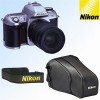Nikon F80QD User Manual - Page 51
Warning
 |
UPC - 718122227020
View all Nikon F80QD manuals
Add to My Manuals
Save this manual to your list of manuals |
Page 51 highlights
Notes on Batteries WARNING Do not leave Keep batteries out of children's reach. If someone accidentally swallows batteries, call a doctor immediately. • Use two CR123A or DL123A lithium batteries Use two CR123A or DL123A lithium batteries. • Change the batteries well before the end of their life and prepare spare batteries before important photographic occasions. • Turn the camera power off when changing batteries Turn the camera power off before changing batteries and insert the batteries with ´ and ‰ ends positioned correctly. • Stains on the battery poles may cause lack of contact. Wipe the batteries well with a dry cloth before installing. • Use fresh batteries at low temperatures Battery power diminishes at extremely low temperatures and the camera may not function properly with old batteries. Use a fresh set of batteries at low temperatures, keep spare batteries warm, and use them alternately. • Film advance speed lowers and number of usable film rolls becomes less at low temperatures. However, battery power may recover when the temperature returns to normal. • Do not throw batteries into a fire or short circuit batteries Do not throw batteries into a fire. Do not short, disassemble, heat or charge batteries. 100 Troubleshooting LCD panel Viewfinder Cause Remedy Page ƒEE blinks ƒEE blinks • CPU Nikkor lens other • Set lens to minimum 18 than G-type is not set aperture. to its minimum aperture. ƒEE blinks ¡ blinks • Attached Speedlight is • Set the Speedlight 87 not set at TTL Auto flash mode to TTL, or Flash in P mode. set the camera's exposure mode to S, A or M. M appears - • Batteries are nearing • Have fresh ones ready. 17 exhaustion. M blinks - • Batteries are just • Turn the power off and 17 about exhausted. replace batteries with new ones. M and Err blink Err blinks • Batteries are • Replace batteries with 17 exhausted during film new ones or recharge rewind. batteries and turn the power on again. If this warning appears frequently, contact authorised Nikon dealer or service centre. ƒ-- blinks ƒ-- blinks • Non-CPU lens is attached or lens is not attached. • Attach CPU lens (except IX-Nikkor). With a non-CPU lens, set the exposure mode to M and set the aperture with lens' aperture ring. 18, 34 Err and E blink Err and • Film is not correctly • Reload film. 21 E blink advanced. s, and Err blink E blinks when exposure meter is turned on Err blinks • Film speed is set to • Load DX-coded film or 21, 36 DX and non-DX-coded set the film speed film is loaded. manually. E blinks when • Film remains in the • Remove the film 29 exposure meter camera after film cartridge. is turned on rewind is complete. 101 Miscellaneous















